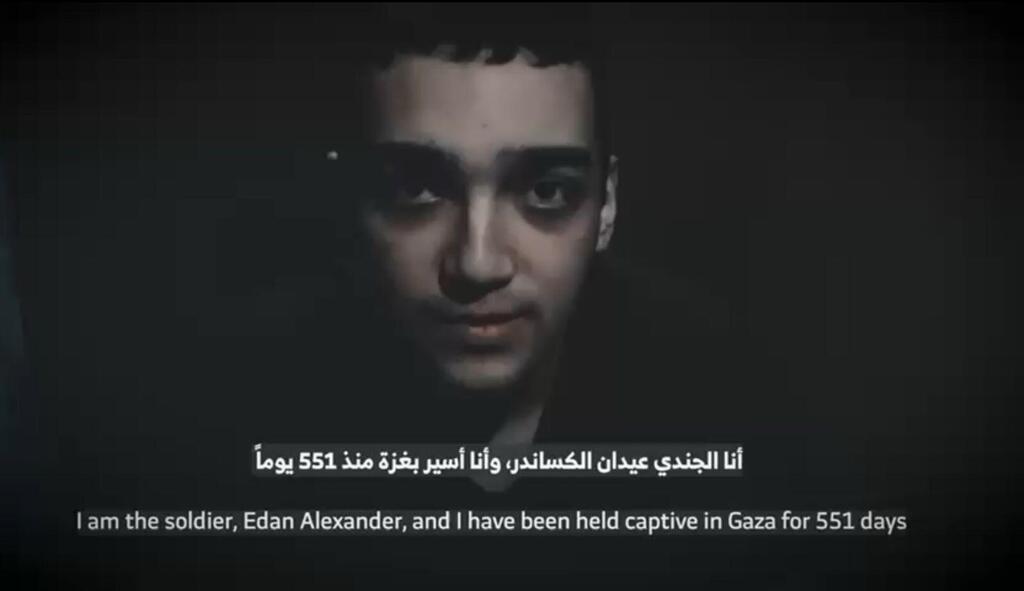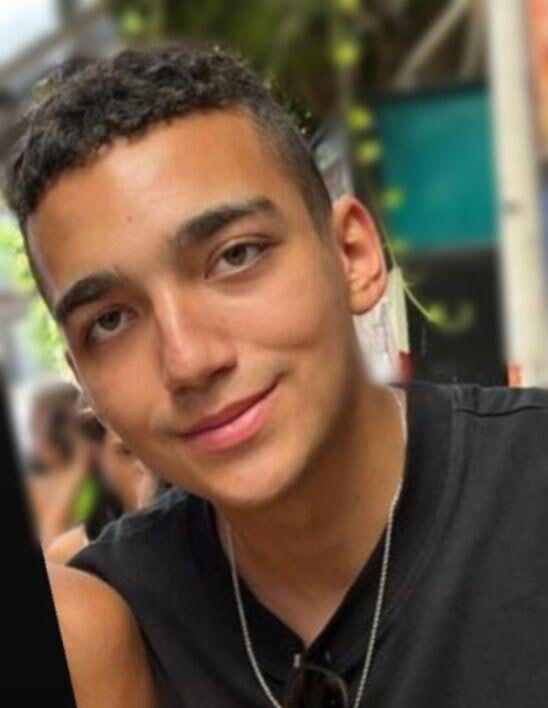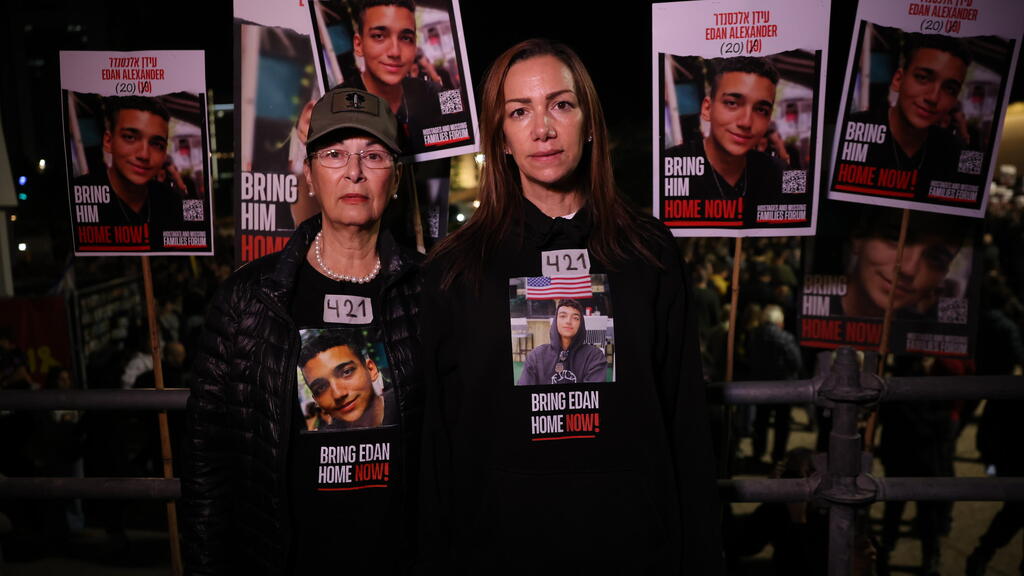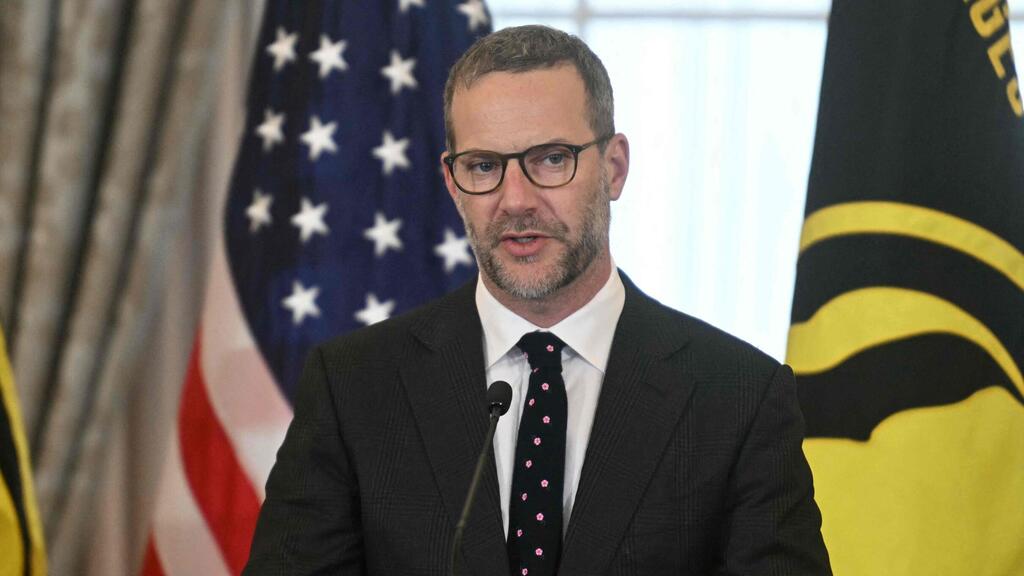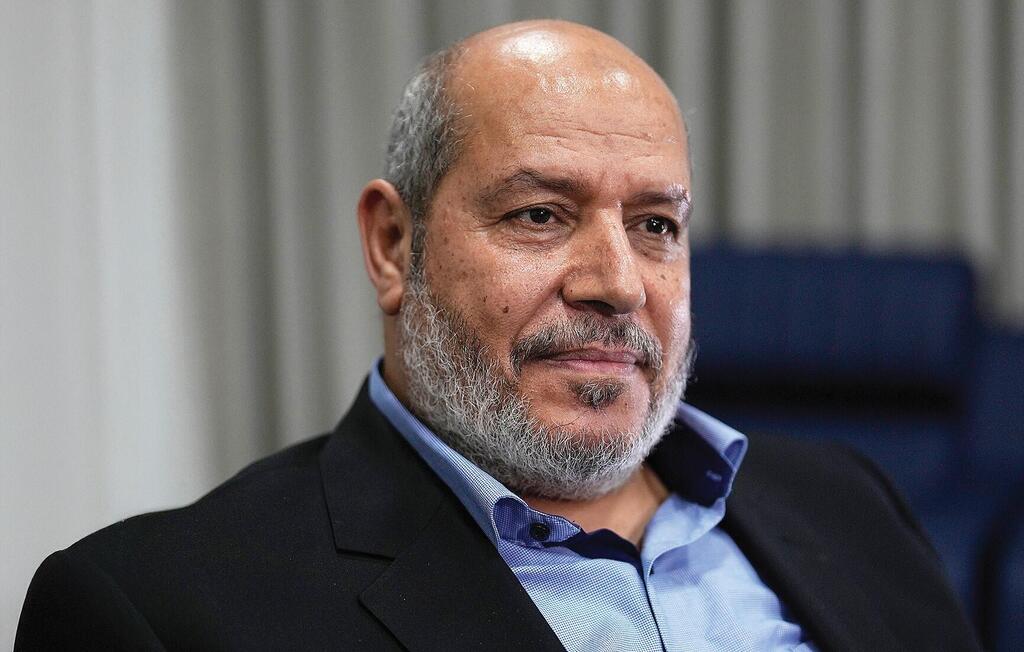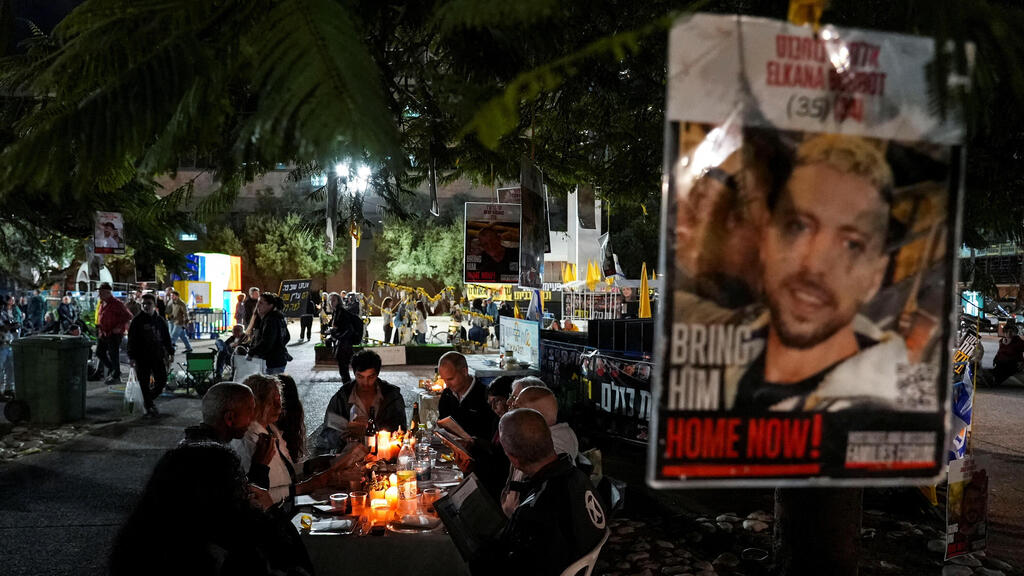During the Hamas assault, he managed to call his mother, tell her that shrapnel had hit his helmet and that he was okay.
During her visit, Yael and her son toured Jaffa before he returned to base on October 2. “Even though as a lone soldier he wasn’t required to stay on base when his mom visited, he insisted. He didn’t want someone else to have to do it for him. On the second night of Sukkot, we did a video call from the sukkah with the whole family. He had just finished guard duty and told us he was going back on duty at 5 a.m.,” Yael said.
That morning, she woke to the first air raid siren and texted him immediately. “We’re safe,” he replied. He didn’t respond after the second siren but managed to call her. “Mom, don’t ask what’s going on here. I’m seeing horrible things. Like World War II. A piece of shrapnel hit my helmet but I’m okay.”
“He sounded busy and tense. I told him to protect himself and said firmly and calmly: ‘I’m here with you. Don’t worry. It’ll be okay. I love you. We’ll talk.’ Then we hung up. And since then, the kid’s been unreachable. I kept texting him — nothing,” she continued.
She immediately called her husband Adi and told him, “Something terrible happened. Get on a flight. I have no idea where he is — he’s vanished.” Together, they began collecting every bit of information they could to share with the authorities in an attempt to locate Edan.
In July, Yael said she’d received several signs of life from her son. “Edani chose to enlist. My poor boy — he was kidnapped. And that’s it? We’re not getting him back?” she said painfully. “My son thought he was doing the most noble thing, protecting Israel. But the second he was taken, the country’s contract with him was broken.”
Describing the first sign of life from her son, she said, “On October 7, many of the hostages saw Edan because they were all gathered in one room before being separated into groups. An older woman who was kidnapped from Nir Oz and later released was the first to give me a sign of life. That Saturday, she sat across from him — he was cuffed and in uniform — and asked, ‘Soldier, where are you from?’
“They started talking. She asked the captors to give him water and uncuff his hands so he could drink. She told him he was very handsome, that she could say that because she’s already a grandma. He told her he was from the U.S. and that his mom was visiting him in Tel Aviv. They had a real conversation,” she added.
“Then the captors interrupted, told everyone to stand and separated them by group — older people, young people, women, Thai workers,” she continued. “From what I understand, the Thai hostages were used as ‘service providers’ between the cells.
“They also told me about Edan after their release. Since they only spoke English, they asked him to translate and explain to the captors that they weren’t Israeli. They said Edan really helped them — they were terrified and didn’t know who to talk to and Edan was there for them.”
Yael also received a testimony from a teenage boy kidnapped from Nir Oz and later released. He saw Edan on October 7 and again just before his own release. “He saw Edan right when he was brought into the holding room. Edan smiled at him and sat next to him. They spoke briefly.
“Edan calmed him down and said, ‘You’re civilians, you’ll get out of here fast. Don’t worry — it’s all politics.’ The boy said that really calmed him. But then they were separated. Later, when he was taken to shower in the tunnels, he was told not to look around. But he did — and saw Edan and others. He went over and spoke with them. Said Edan still seemed okay.”
Another woman who was kidnapped with her husband and later released told Yael that they had also encountered Edan. “They arrived terrified to the room where the boy and Edan were. She too received a smile from Edan and went to sit next to him,” Yael recounted. “He calmed them down too and said, ‘You’re civilians, not involved in this mess. You’ll be released.’ She said that thanks to him, they managed to calm down and breathe for a moment.
“She recalled Edan being very composed — he didn’t cry or seem distraught. She remembered they were given a can of tuna to eat and by that point, Edan and the boy were no longer cuffed — apparently they realized they weren’t a threat and released their hands,” Yael said. “The updates from the released hostages gave me hope — but also flooded me with so much sadness. I just want him out of there already, my Edani.”
After the video was released, Alexander’s family said in a statement: “As we prepare to celebrate Passover in the U.S. and our family in Israel gathers for the holiday meal, our Edan — an American lone soldier who moved to Israel and joined the Golani Brigade to protect it and its people — is still being held hostage by Hamas. So as you sit down to celebrate Passover, remember — it’s not a holiday of freedom until Edan and the other 58 hostages are home.”
In late November 2023, 421 days after Edan Alexander was abducted from his military base during Hamas’s October 7 attack, the terror group released its first video of the American-Israeli soldier in captivity. The chilling 90-second clip, filmed in what appeared to be a dimly lit underground chamber, showed Alexander seated against a concrete wall, his face gaunt but composed.
Dressed in a plain gray sweatshirt, he delivered a carefully scripted message that blended personal pleas with political criticism, reflecting Hamas’s strategic use of psychological warfare. His family, after consulting with Israeli security officials, approved the video’s release in hopes it would reignite global attention to his plight.
Dressed in a plain gray sweatshirt, he delivered what was likely a carefully scripted message that blended personal pleas with political criticism, reflecting Hamas’s strategic use of psychological warfare. His family, after consulting with Israeli security officials, approved the video’s release in hopes it would reignite global attention to his plight.
Hamas' first video of Edan Alexander in captivity
Alexander began by addressing Trump. “President Trump, my name is Edan Alexander. I’m a U.S.-Israeli citizen held captive in Gaza. As an American, I’ve always believed in the strength of the United States. Now, I’m begging you — use your power and influence to negotiate our release.
“Every day here feels like an eternity. The pain inside grows worse. Please don’t make the same mistake [Joe] Biden did. The weapons he sends are killing us. I don’t want to die like Hersh, another American friend.”
“Our guards told us about the new instructions they received. The moment the IDF gets close to our location, our fear peaks. We die a thousand times every day, and no one feels us.”
Alexander also talked to his family. “Mom, Dad, Grandpa, Grandma — each day the pain inside grows. I miss you terribly. I pray to see you again soon. Please stay strong. It’s only a matter of time until this nightmare ends.
“People of Israel—don’t abandon us. Protest every day. Put pressure on the government. It’s not fair that we pay for their mistakes,” he added.
In the first round, Boehler met with Hamas officials who demanded the release of 500 Palestinian prisoners — including 100 serving life sentences for deadly attacks — in exchange for Alexander. Boehler dismissed this as “fantasy-land stuff,” per a source familiar with the talks.
In the final round of talks, with Trump eager to announce a deal during his March 4 State of the Union address, Boehler presented a “final offer”: 100 prisoners for Alexander, plus the release of Palestinian women and minors in exchange for the American bodies.
Al-Hayya claimed he “personally supported” the deal but lacked authority to approve it without sign-off from Hamas’s Gaza leadership. Talks collapsed hours before Trump’s speech.
The negotiations unraveled amid mistrust between U.S. and Israeli officials. Boehler had not coordinated his offers with Israel, leading to a heated call with Strategic Affairs Minister Ron Dermer, Netanyahu’s top negotiator. “Who gave you the right to decide which terrorists we release?”
Dermer reportedly shouted, per an Israeli source. Days later, Axios leaked details of the talks — a move U.S. officials blamed on Israel to sabotage progress.
Hamas further muddied the waters by releasing Alexander’s medical records to Saudi outlet Al Arabiya in March, claiming he required urgent care. While unverified, the leak aimed to portray Hamas as “cooperative” while casting Israel as indifferent — a narrative Alexander’s family rejected. “Stop playing games with my son’s life,” Yael Alexander said in a televised plea.
Fifty-nine hostages are currently being held in Gaza, of whom 24 are still considered alive. Of these, 20 have provided confirmed signs of life. Since fighting resumed, Hamas has released weekly videos of various hostages in an effort to pressure Israel into agreeing to a deal.
Last week, the terror group released a video showing signs of life from Bar Kupershtein and Maxim Herkin. The week before, a video featuring Elkana Bohbot was released. Five days before that, Hamas had already published another video of Bohbot alongside fellow hostage Yosef Haim Ohana.
Behind the scenes, Israel’s negotiation team is in contact with mediators — primarily Egypt and in coordination with the U.S. — to try to break the deadlock in talks with Hamas. An Israeli official said Saturday night that “the ball is in Hamas’s court.”
The terror group has already refused to respond to Israel’s proposal to release 11 living hostages, including Alexander and has not yet replied to a new Egyptian offer involving the release of 8 living hostages.
The Israeli team is now working to maximize the number of living hostages who would be freed at the beginning of any potential deal. Meanwhile, the government continues to oppose a comprehensive agreement that would involve the release of all hostages in exchange for ending the war.
As talks proceed, Israel’s chief negotiator Dermer has come under criticism in recent days for a lack of progress. However, he was publicly backed by Prime Minister Benjamin Netanyahu, who issued a statement of support.
Netanyahu’s office denied a CNN report citing sources who claimed that the talks have “significantly slowed” since Dermer took charge.
According to one source, the slowdown is due to Netanyahu’s desire to exert tighter control over the negotiations for political reasons. “Dermer is working around the clock on the hostage issue and leading it in all its aspects,” Netanyahu’s office said in a statement released after the Sabbath.
“The orchestrated smear campaign against him is unwarranted, does not reflect reality, serves Hamas propaganda and harms the families of the hostages.”


